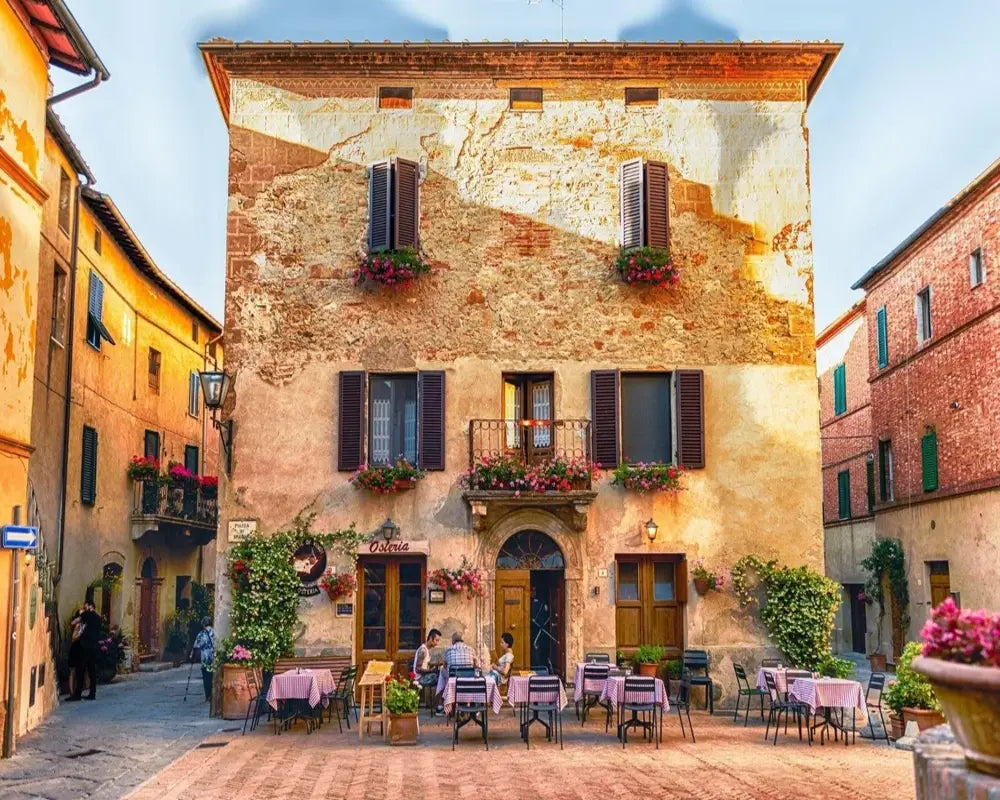There is a rhythm to life in Tuscany that moves differently from the rest of the world. In a small village nestled between rolling vineyards and olive groves, I found myself immersed in a pace of life so slow, so deliberate, that it forced me to reconsider everything I knew about time, food, and human connection.
Slowing Down to See More
The first thing I noticed when I arrived in the village of Montefioralle was the quiet. Not an eerie silence, but a kind of peaceful hush, broken only by the occasional church bell or the distant laughter of children playing in the square. Life here did not rush. There was no honking traffic, no neon lights flashing demands, no relentless notifications pulling attention away from the present moment.
At first, this slowness felt uncomfortable. I was used to efficiency, to schedules, to the satisfaction of checking things off a list. But after just a few days, I realized that in my everyday life, I had been moving so fast that I had stopped noticing the details—the scent of fresh basil in a kitchen window, the way the sunlight painted golden streaks across the old stone buildings at dusk, the warmth of a genuine conversation with a stranger.

Food as an Act of Love
One of the most profound lessons I learned in Tuscany was about food. Here, cooking is not just a necessity; it is an experience, a tradition, an art form. I was invited into the home of a local family, where I watched three generations of women prepare a meal together with practiced ease.
There were no shortcuts—no pre-packaged sauces, no rushing through recipes. The pasta was rolled out by hand, cut with a knife passed down through the family, and laid out to dry under the open kitchen window. Tomatoes, plucked straight from the garden that morning, were slow-cooked into a sauce rich with garlic and fresh herbs. And when we finally sat down to eat, the meal stretched into hours, filled with laughter, stories, and an appreciation for every bite.
Back home, I was used to meals being something I squeezed in between tasks. But in Tuscany, I learned that food is not just fuel—it is a reason to gather, to celebrate, to nourish both the body and the soul.
The Beauty of Doing Nothing
In the afternoons, I would see elderly men sitting on benches in the square, sipping espressos and watching the world go by. No one was in a hurry. No one was looking at their phone. They were simply present.
I joined them one day, sitting outside a tiny café with a cappuccino in hand. At first, I felt restless. Should I be reading something? Writing something? Documenting the moment? But as I sat there, with nothing to do but watch the soft sway of the cypress trees in the breeze and listen to the occasional clink of espresso cups, I understood what the Italians call la dolce far niente—the sweetness of doing nothing.
In a world where productivity is often seen as the ultimate virtue, this tiny village reminded me that sometimes, the most valuable moments are the ones spent simply being.
Connection Over Convenience
The people in Montefioralle knew each other’s names. They stopped in the street to chat. They bought their bread from the same bakery their grandparents had shopped at decades before. There was no need for convenience stores or express checkout lines. Here, relationships were valued over efficiency.
One evening, as I walked back to my guesthouse, a woman from the village stopped me. I had met her only once, but she remembered my name, asked about my day, and insisted I join her family for dinner the next night. There was a warmth in her invitation that felt entirely natural, a kind of hospitality that had nothing to do with politeness and everything to do with genuine human connection.
Taking Tuscany Home
When I finally left Tuscany, I carried more than just memories—I carried a new understanding of what it means to live well.
I no longer rush through meals. I make time for slow mornings and quiet evenings. I try to spend more time in conversation and less time in front of a screen. I remind myself that life is not measured by how much we accomplish in a day, but by how fully we experience it.
Tuscany taught me that slowness is not laziness—it is an art, a philosophy, a way of life. And in a world that moves at breakneck speed, sometimes the most radical thing we can do is simply slow down.





